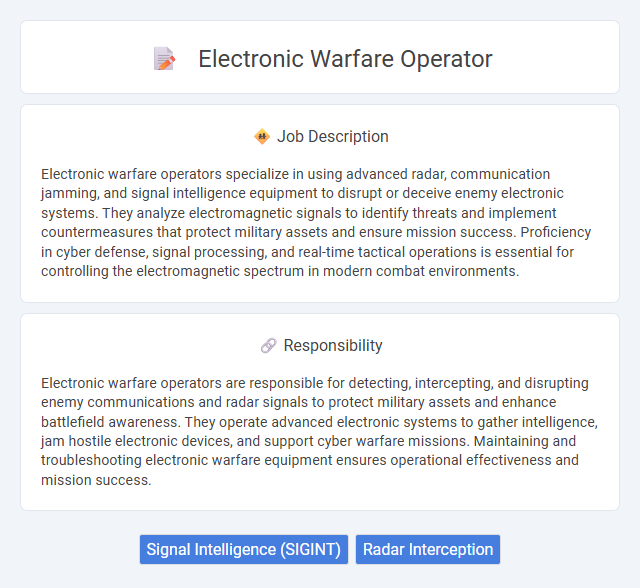
Electronic warfare operators specialize in using advanced radar, communication jamming, and signal intelligence equipment to disrupt or deceive enemy electronic systems. They analyze electromagnetic signals to identify threats and implement countermeasures that protect military assets and ensure mission success. Proficiency in cyber defense, signal processing, and real-time tactical operations is essential for controlling the electromagnetic spectrum in modern combat environments.
Electronic warfare operators are likely to thrive if they possess strong analytical skills, quick decision-making abilities, and high stress tolerance due to the demanding and fast-paced nature of the job. Individuals with a keen interest in technology and electronic communication systems may find this role particularly engaging and suitable. Those who struggle with high-pressure environments or lack adaptability might face challenges meeting the job's requirements.
Qualification
Electronic warfare operators require specialized training in signal analysis, radar systems, and electronic countermeasures. Candidates typically hold certifications in electronic technology or military electronics, along with proficiency in cybersecurity protocols and communication systems. Strong analytical skills and the ability to operate advanced electronic warfare equipment under high-pressure environments are essential qualifications for this role.
Responsibility
Electronic warfare operators are responsible for detecting, intercepting, and disrupting enemy communications and radar signals to protect military assets and enhance battlefield awareness. They operate advanced electronic systems to gather intelligence, jam hostile electronic devices, and support cyber warfare missions. Maintaining and troubleshooting electronic warfare equipment ensures operational effectiveness and mission success.
Benefit
An electronic warfare operator likely gains exposure to cutting-edge technology, enhancing specialized technical skills in signal analysis and cyber defense. The role probably offers significant opportunities for career advancement within military or defense sectors, coupled with competitive pay and comprehensive benefits packages. Job stability and potential for continuous training may attract individuals seeking long-term professional development in high-demand electronic warfare fields.
Challenge
Electronic warfare operator roles likely involve navigating complex and rapidly evolving electromagnetic environments, requiring strong analytical skills to detect and counteract threats effectively. The operator may face high-pressure situations where timely decision-making is crucial to maintain communication security and mission success. Adapting to advanced technologies and unpredictable combat scenarios probably presents continuous challenges demanding both technical expertise and strategic thinking.
Career Advancement
Electronic warfare operators develop specialized skills in signal intelligence and electronic countermeasures, positioning themselves for advanced technical roles and leadership opportunities within defense agencies. They gain expertise in analyzing electromagnetic spectrum data and deploying electronic attack methods, which are critical for career progression into tactical command and strategic planning positions. Continuous training and certifications in emerging technologies enhance their qualifications for higher ranks and cross-functional roles in cyber operations and intelligence analysis.
Key Terms
Signal Intelligence (SIGINT)
Electronic warfare operators specializing in Signal Intelligence (SIGINT) intercept, analyze, and exploit enemy communications and radar signals to gain tactical advantages on the battlefield. They utilize advanced electronic systems to detect, locate, and disrupt adversary transmissions, contributing to real-time intelligence collection and electronic attack missions. Proficiency in signal processing, cryptography, and electronic surveillance enables these operators to support strategic decision-making and enhance situational awareness.
Radar Interception
Electronic warfare operators specializing in radar interception utilize advanced signal processing techniques to detect, analyze, and counter enemy radar emissions, enhancing battlefield awareness and survivability. Their expertise in identifying radar frequencies and waveforms enables the disruption of hostile tracking and targeting systems. Proficiency in radar interception technology is critical for electronic countermeasures and electronic support operations within military missions.
 kuljobs.com
kuljobs.com